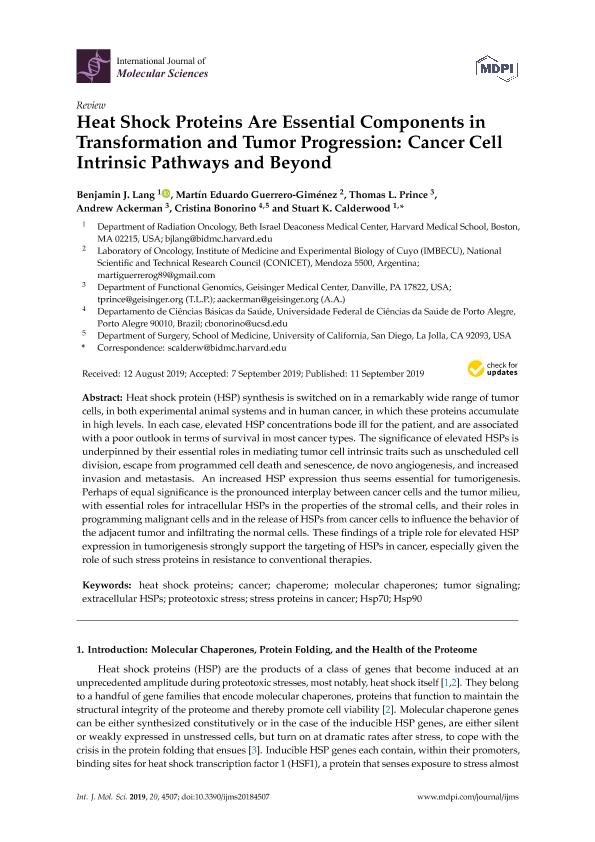Artículo
Heat shock proteins are essential components in transformation and tumor progression: Cancer cell intrinsic pathways and beyond
Lang, Benjamin J.; Guerrero Gimenez, Martin Eduardo ; Prince, Thomas L.; Ackerman, Andrew; Bonorino, Cristina; Calderwood, Stuart K.
; Prince, Thomas L.; Ackerman, Andrew; Bonorino, Cristina; Calderwood, Stuart K.
 ; Prince, Thomas L.; Ackerman, Andrew; Bonorino, Cristina; Calderwood, Stuart K.
; Prince, Thomas L.; Ackerman, Andrew; Bonorino, Cristina; Calderwood, Stuart K.
Fecha de publicación:
09/2019
Editorial:
Institute for Digital Multidisciplinary Publication
Revista:
International Journal of Molecular Sciences
ISSN:
1661-6596
Idioma:
Inglés
Tipo de recurso:
Artículo publicado
Clasificación temática:
Resumen
Heat shock protein (HSP) synthesis is switched on in a remarkably wide range of tumor cells, in both experimental animal systems and in human cancer, in which these proteins accumulate in high levels. In each case, elevated HSP concentrations bode ill for the patient, and are associated with a poor outlook in terms of survival in most cancer types. The significance of elevated HSPs is underpinned by their essential roles in mediating tumor cell intrinsic traits such as unscheduled cell division, escape from programmed cell death and senescence, de novo angiogenesis, and increased invasion and metastasis. An increased HSP expression thus seems essential for tumorigenesis. Perhaps of equal significance is the pronounced interplay between cancer cells and the tumor milieu, with essential roles for intracellular HSPs in the properties of the stromal cells, and their roles in programming malignant cells and in the release of HSPs from cancer cells to influence the behavior of the adjacent tumor and infiltrating the normal cells. These findings of a triple role for elevated HSP expression in tumorigenesis strongly support the targeting of HSPs in cancer, especially given the role of such stress proteins in resistance to conventional therapies.
Archivos asociados
Licencia
Identificadores
Colecciones
Articulos(IMBECU)
Articulos de INST. DE MEDICINA Y BIO. EXP. DE CUYO
Articulos de INST. DE MEDICINA Y BIO. EXP. DE CUYO
Citación
Lang, Benjamin J.; Guerrero Gimenez, Martin Eduardo; Prince, Thomas L.; Ackerman, Andrew; Bonorino, Cristina; et al.; Heat shock proteins are essential components in transformation and tumor progression: Cancer cell intrinsic pathways and beyond; Institute for Digital Multidisciplinary Publication; International Journal of Molecular Sciences; 20; 18; 9-2019; 1-26
Compartir
Altmétricas



